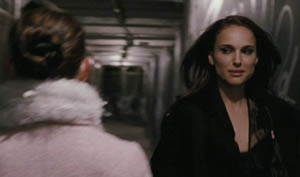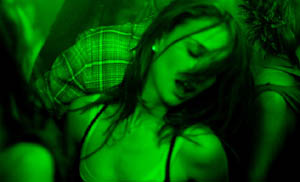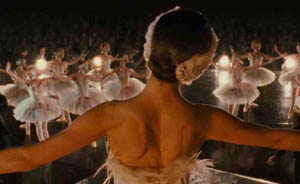|
The overbearing, push-them-till-they-break dance choreographer Thomas Leroy spells out the scenario for us in the early stages: a princess, the White Swan, meets and falls for her great love, but a dark twin, the Black Swan, arrives and seduces him away from her. Distraught, she kills herself. Furthermore, though the two swans are different characters, they must be played by the same dancer. He's speaking in the literal sense of the ballet Swan Lake, of course, but he's also telling us what we can expect to see over the next two hours. 
Natalie Portman is Nina, an up-and-coming ballerina who's a walking bundle of neuroses. In one of the first scenes, she seems to spot a girl who looks oddly like herself in the next subway car. It won't be the last time she sees this mysterious other, and it tells us right off that in all likelihood, Nina has more than a few problems. More than anything, she seems to want the lead in the upcoming Swan Lake production. I say "seems," because it's hard to know just where her desires truly lie. She's cold and remote, technically skilled but lacking in real feeling, real emotion; look at any one of those nitwit American Idol-manufactured pop stars if you're unsure of the difference. There's also the little matter of her mom, with whom she still shares a home and an unsettling relationship. Her mother was once a dancer who never made it too far. It's implied, in a passing but significant moment, that Nina's birth was the reason for Mom's abbreviated career. The two sometimes banter like sisters; at other times, Mom treats Nina like a child or a dim-witted pet. One wonders just which of the pair is the one with real aspirations of stardom. As is so often the case, parents attempting to live vicariously through their offspring can be as comforting and nurturing as a sockful of fire ants. 
Ultimately, Nina will land the position of lead dancer, but her problems will hardly end there. Her unwillingness or inability to fully let go and display a raw emotional side frustrates Thomas, who makes all manner of uncomfortably inappropriate comments and suggestions, often in mixed company, as to how she might deal with her apparent repression. At the same time, a newly-arrived dancer named Lily starts attracting attention-she's lacking in technique, but makes up for it in sheer abandon. She approaches Nina as a potential friend; Nina regards the new girl with an unnerved distrust, seeing her as a potential usurper. Nevertheless, she's an alternative to the rigid control imposed by her mother, a role model of the free spirit. Despite her shyly professed assertions to the contrary, Nina doesn't seem to have any concept of relating to men at all. Her life begins to parallel that of the White Swan, except that it isn't the love of a man, but the love of an ideal, that drives her. Thomas complains that he's never seen her lose herself in her performance. He's grossly underestimated her commitment. The film never leaves Lily for so much as a single scene. Every frame is the world as she perceives it. In earlier stages of the film, we grow to dislike her mother's possessive nature; later, we wonder if perhaps it might be necessary. Is her control-freak mentality the cause of Nina's behavior, or a reaction to it? Are the pair of them some sort of horrible feedback loop, perpetuating one another's worst traits? Nina describes the tragic White Swan's ultimate fate as beautiful and romantic, the sort of comment that sets off warning alarms in the minds of the well-adjusted. The reality of scenes becomes increasingly suspect, the hallucinatory nature of some of them easily explicable, others less and less so. 
Director Darren Aronofsky has specialized in offbeat stories and presentations, and one shouldn't expect anything along the lines of a standard final act here. The film is melodrama as purely as any I've seen. At times, it borders on the absurd, though often it later seems as though it was intended to. At other times, it does go too far over the top: a music box as a symbol of lost childhood innocence has already been done too many times to feel sincere, attached ballerina symbolism or no. But someone needs to make films like this, and it's best that they have some actual talent. Black Swan takes some odd turns down some odder corridors, but it all works if one is willing to be taken someplace unconventional, and the director wisely does allow for a few laughs now and again; following a delirious night of drug-induced dabbling on the wild side (in a scene quite capable of genuinely causing seizures), Lily responds to Nina's queries about what happened between them with not only the best line in this film, but the best line I've heard in the past handful of films I've seen. And I have to admit, past observations notwithstanding, there is something beautiful and romantic about the way it all ends. But only because it's just a movie. -review by Matt Murray
|
|
||||||||